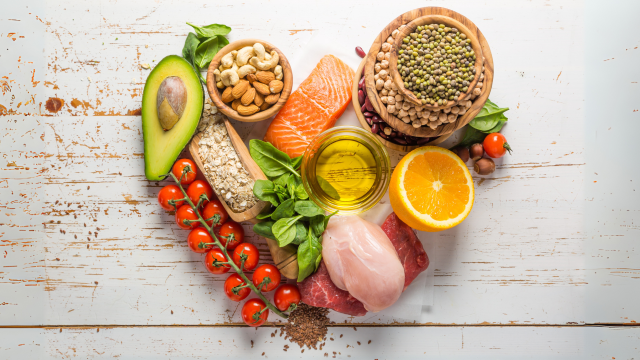14
Feb
Love Your Heart This Valentine’s Day by Following the Science on Pesticides

(Beyond Pesticides, February 14, 2025) A study in the European Journal of Preventive Cardiology finds that organic food consumption lowers the risk of developing atherosclerotic cardiovascular disease (ASCVD). Heart health is important not just on Valentine’s Day, but every day. While celebrating with friends and family, consider spreading love in ways that promote long-term health and wellness with an organic meal paired with organic flowers and chocolates.
Eliminating exposure to petrochemical pesticides and synthetic fertilizers, such as with an organic diet, mitigates disease risks including brain and nervous system disorders, cancer, endocrine disruption, and cardiovascular disease (CVD). In this latest study, the scientists and doctors analyze registered diagnoses of ASCVD from the Danish National Patient Register in comparison with the diets of a cohort of middle-aged women and men from the Danish Diet, Cancer and Health study.
The eligible study participants, including 41,407 men and women of which 5,365 developed ASCVD, filled in a detailed 192-item food frequency questionnaire and a lifestyle questionnaire on their consumption of organic vegetables, fruit, dairy products, eggs, meat, and bread and cereal products. The authors report that the results show overall organic food consumption is associated with a 6% lower incidence rate of ASCVD. For specific food categories, statistically significant results are noted for eggs in both men and women, as well as bread and cereal products in men being associated with lower ASCVD incidence.
Dietary habits are an important factor for heart health and may influence disease risk. The researchers explain this study’s novelty in saying, “Previous investigations of the role of dietary factors in prevention of ASCVD have focused on specific foods and nutrients, without distinguishing between production practices such as organic versus conventional produce.”
This study adds to the ever-growing body of science that has linked pesticide exposure to negative effects on cardiovascular health for many decades. The findings reinforce scientific understanding that heart disease is preventable and eliminating toxics in diet can play an important role in reducing a major public health threat. As the authors report, “Worldwide, CVD collectively remain the leading cause of disability-adjusted life years (DALYs) and death in adults over 50 years.”
The researchers reference previous studies relating to cardiovascular disease that show:
- “Occupational and/or environmental exposure to organophosphate and organochlorine pesticides has previously been associated with a higher risk of important [CVD] factors such as hypertension, metabolic syndrome and also a higher risk of myocardial infarction.” (See studies here and here.)
- Studies (see here and here) associate pesticides with the “potential to influence energy homeostasis with disruption of glucose and lipid metabolism which may increase the risk of ASCVD.”
- “[O]rganically produced foods have higher levels of polyphenols, omega-3 fatty acids, and lower levels of cadmium and antibiotic-resistant bacteria. Both polyphenols and omega-3 fatty acids may exert a variety of beneficial health effects and have been associated with a lower risk of CVD in observational studies.” (See studies here, here, here, here, and here.)
- A French study finds higher organic food consumption is associated with a lower prevalence of metabolic syndrome and “with individual markers of cardiometabolic health including lower levels of fasting glucose, waist circumference, blood pressure, and triglycerides.”
As the study results find organic bread and cereal products are associated with lower incidence of ASCVD in men, this raises the topic of sex-specific pesticide effects. (See previous Daily News coverage here and here.) As an explanation of these results, the researchers share, “Previous research suggests that men are generally more prone to CVD risk factors such as oxidative stress and inflammation than women and that men tend to have higher baseline levels of these conditions.”
Overall, including all food groups, the authors find that an organic diet benefits both men and women and supports prior research. (See study here and Daily News coverage here and here.) The researchers postulate that these health benefits from consuming organic foods may be attributed to lower levels of pesticide residues, as these compounds can cause oxidative stress and inflammation that increase disease risk.
This Valentine’s Day, protect your heart, and show those you love how much you truly care, by choosing organic foods and gifts. Unfortunately, most gifts come at a cost much higher than the one on the price tag. Conventional roses and chocolate sold in the U.S. are produced using toxic pesticides, with little regard for the workers or the environment. (See studies of pesticide residue on flowers here, here, and here, as well as the benefits of organic chocolate here, here, and here.)
Ensure that any flowers and chocolates you choose to buy are organic or opt for other creative ways of expressing your love. A hand-crafted card, picture collage, poem, or even a special homemade, organic dinner are all ways to show someone you care, while also spreading love to the environment and society.
Happy Valentine’s Day! 💕 💕 💕 💕 💕
This Valentine’s Day—Become a Member!
When you join Beyond Pesticides, you add your voice to the urgent movement to eliminate fossil fuel-based pesticide use within the next 10 years, and help put a stop to toxic emissions, exposure, and advocate for public health and the environment. Help us continue to raise the alarm about the climate crisis, biodiversity decline, and health challenges, and promote the solution: organic agriculture and land management. Join today to be part of organic solution! You will also receive the latest edition of Pesticides and You as a part of your membership! Your membership and any additional contributions are tax-deductible.
All unattributed positions and opinions in this piece are those of Beyond Pesticides.
Source:
Andersen, J. et al. (2025) Organic food consumption and the incidence of atherosclerotic cardiovascular disease in the Danish Diet, Cancer and Health cohort, European Journal of Preventive Cardiology. Available at: https://academic.oup.com/eurjpc/advance-article/doi/10.1093/eurjpc/zwaf057/8003732.










